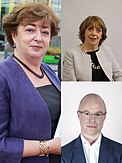| |||||||||||||||||||||||||||||||||||||||||||||||||||||||||||||||||||||||||||||||||||||||||||||||||||||||||||||||||||||||||||||||||||||||||||||
158 seats in Dáil Éireann[a] 79 seats needed for a majority | |||||||||||||||||||||||||||||||||||||||||||||||||||||||||||||||||||||||||||||||||||||||||||||||||||||||||||||||||||||||||||||||||||||||||||||
|---|---|---|---|---|---|---|---|---|---|---|---|---|---|---|---|---|---|---|---|---|---|---|---|---|---|---|---|---|---|---|---|---|---|---|---|---|---|---|---|---|---|---|---|---|---|---|---|---|---|---|---|---|---|---|---|---|---|---|---|---|---|---|---|---|---|---|---|---|---|---|---|---|---|---|---|---|---|---|---|---|---|---|---|---|---|---|---|---|---|---|---|---|---|---|---|---|---|---|---|---|---|---|---|---|---|---|---|---|---|---|---|---|---|---|---|---|---|---|---|---|---|---|---|---|---|---|---|---|---|---|---|---|---|---|---|---|---|---|---|---|---|
| Opinion polls | |||||||||||||||||||||||||||||||||||||||||||||||||||||||||||||||||||||||||||||||||||||||||||||||||||||||||||||||||||||||||||||||||||||||||||||
| Turnout | 65.1% | ||||||||||||||||||||||||||||||||||||||||||||||||||||||||||||||||||||||||||||||||||||||||||||||||||||||||||||||||||||||||||||||||||||||||||||
| |||||||||||||||||||||||||||||||||||||||||||||||||||||||||||||||||||||||||||||||||||||||||||||||||||||||||||||||||||||||||||||||||||||||||||||
| |||||||||||||||||||||||||||||||||||||||||||||||||||||||||||||||||||||||||||||||||||||||||||||||||||||||||||||||||||||||||||||||||||||||||||||
The 2016 Irish general election to the 32nd Dáil was held on Friday 26 February, following the dissolution of the 31st Dáil by President Michael D. Higgins on 3 February, at the request of Taoiseach Enda Kenny.[3] The general election took place in 40 Dáil constituencies throughout Ireland to elect to elect 158 Teachtaí Dála to Dáil Éireann, the house of representatives of the Oireachtas.[4] There was a reduction of eight seats under the Electoral (Amendment) (Dáil Constituencies) Act 2013. Fine Gael were returned to government as a minority administration.
Fine Gael, led by Kenny, lost 26 seats, but remained the largest party in the Dáil with 50 seats. The main opposition party Fianna Fáil, which in 2011 had suffered its worst-ever election result of 20 seats, increased to 44 seats. Sinn Féin became the third-largest party with 23 seats. The Labour Party, which had been the junior party in coalition government with Fine Gael and which had returned its best-ever showing of 37 seats in 2011, fell to just 7 seats, its lowest-ever share of Dáil seats. Smaller parties and independent politicians made up the remaining 34 seats.[5][6]
The 32nd Dáil met on 10 March and elected a new Ceann Comhairle, the first to be elected by secret ballot, which was won by Seán Ó Fearghaíl of Fianna Fáil. The Dáil proceeded to the nomination of Taoiseach, but no candidate received a majority. Kenny formally resigned as Taoiseach that same day, but remained as caretaker until a new government was formed.[7] Kenny sought an agreement with Fianna Fáil to form a government,[8] and negotiations continued through most of April. An agreement was finally reached in which Fianna Fáil would tolerate a Fine Gael–led minority government on 29 April, 63 days after the election, and the Dáil formally re-elected Kenny as Taoiseach on 6 May. Kenny was the first Taoiseach from Fine Gael to win re-election.[9]
Following the introduction of gender quotas, a record 35 seats were filled by women, bringing the proportion of women in the Dáil to 22 percent, up from 15 percent at the previous general election.
- ^ Electoral Act 1980, s. 36: Re-election of outgoing Chairman of Dáil (No. 23 of 1980, s. 36). Enacted on 23 December 1980. Act of the Oireachtas. Retrieved from Irish Statute Book.
- ^ "Dún Laoghaire: 2016 general election". Irish Elections. Archived from the original on 29 August 2023. Retrieved 20 August 2022.
- ^ "President Higgins dissolves 31st Dáil". Irish Times. 3 February 2016. Archived from the original on 3 February 2016. Retrieved 3 February 2016.
- ^ Cite error: The named reference
environ44152was invoked but never defined (see the help page). - ^ "Peter Burke and Willie Penrose elected in Longford–Westmeath". The Irish Times. 3 March 2016. Archived from the original on 6 July 2016. Retrieved 8 May 2016.
- ^ Dan MacGuill (3 March 2016). "Labour just had the worst election in its 104-year history". TheJournal.ie. Archived from the original on 16 February 2020. Retrieved 8 May 2016.
- ^ "Enda Kenny to continue as caretaker Taoiseach". RTÉ.ie. 11 March 2016. Archived from the original on 11 March 2016. Retrieved 11 March 2016.
- ^ "Enda Kenny confirms he'll contact Fianna Fáil about formation of new government on Friday". Independent.ie. 30 March 2016. Archived from the original on 5 May 2016. Retrieved 8 May 2016.
- ^ Cite error: The named reference
GovtAgreementwas invoked but never defined (see the help page).
Cite error: There are <ref group=lower-alpha> tags or {{efn}} templates on this page, but the references will not show without a {{reflist|group=lower-alpha}} template or {{notelist}} template (see the help page).
Cite error: There are <ref group=n> tags on this page, but the references will not show without a {{reflist|group=n}} template (see the help page).







